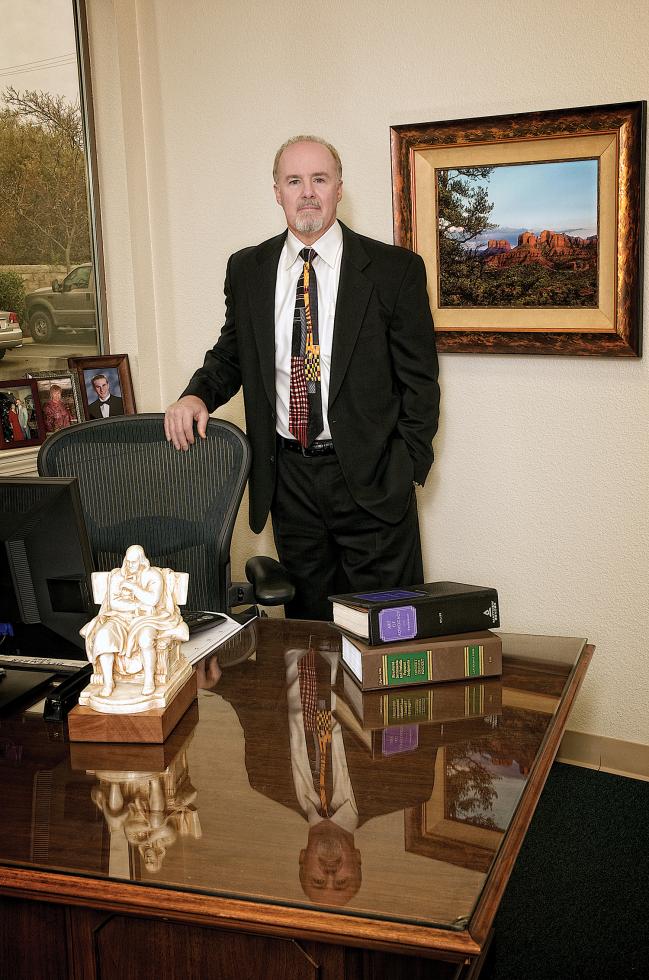Rick Bishop’s firm was listed among the fastest-growing companies
in America

Rick Bishop is a resolution rebel, and a successful one at that.
His structured settlement firm was named among the fastest-growing private companies in America in Inc. Magazine’s 2009 rankings, but a shaky economy has left him wondering if his forward strides can be sustained through 2010 and 2011.
Based in Elk Grove, Settlement Professionals Inc. operates 25 offices in 14 states, including regional work spaces in Roseville and Sacramento. SPI grew by 252.8 percent between 2005 and 2008, according to Inc., a window when revenues from the establishment of trusts equaled $2.3 million, and revenue increased to $8.2 million.
Bishop credits his success to a countercultural approach to the structured-settlement industry. Since the Internal Revenue Service tax code changed in 1982, plaintiffs in personal-injury and wrongful-death cases have been allowed to receive periodic payments of their settlement and profit from the investment of that money tax-free. As such, defendant attorneys have hired insurance professionals to purchase annuities and set up structured settlements that pay out over several years.
Peter Arnold, a consultant to the Washington-based National Structured Settlements Trade Association, says the industry has not grown during the past few years, issuing about $6 billion in life insurance annuities annually for future structured payments.
About 700 consultants work in companies consisting of one or two insurance investors to hundreds of settlement specialists run by one structured-settlement company umbrella. Some have been in the business since the early 1980s and others opened in the early 2000s. All navigate a complex legal maze of tax and financial codes. This business requires such a specialized knowledge that it would be difficult to be a part-time settlement consultant,” Arnold says.
Bishop and his partner, Portland-based financial planner Jack Meligan, thought the allegiances in many typical settlement arrangements were all wrong. “We represent the plaintiff, not the defendant,” Bishop says. For that reason, SPI offers comprehensive settlement planning that takes into consideration a victim’s short- and long-term financial needs, wants and desires, possible government benefits, tax implications and the need for diversification. SPI’s attorneys, certified financial planners and insurance professionals can be called on to develop a personalized plan to meet needs that may or may not include a structured settlement.
“This is often the only chance there is for these people to have an income for the rest of their lives,” Bishop says. His clients may not be able to work again and are often paraplegic, quadriplegic or have suffered brain damage.
While a structured settlement can protect injured parties from losing a lump sum settlement, Bishop says all investment options and their tax and Medicaid/Medicare implications need to be considered before taking advantage of the IRS’ one-time tax-free allowance.
If Bishop and his team set up an investment stream correctly, his clients shouldn’t have to turn to factoring companies like J.G. Wentworth later to purchase their annuity payments for a hefty fee.
As a 35-year veteran of the insurance industry, Bishop was an “accidental-settlement professional” — an insurance agent. He didn’t even know there was a structured-settlement industry until he was approached in the early 1980s about setting up an annuity for a dog-bite case in Monterey, Calif.
Then, in 2001, his son suffered brain damage in a car accident. Bishop’s son has since recovered his functional ability with the exception of some short-term memory loss, but that experience brought the plaintiff experience home for Bishop. “After years in court to reach a settlement, many people don’t know how to manage their situations to pay medical costs and support themselves for the foreseeable future,” Bishop says.
The partners co-founded the Society of Settlement Planners to promote victim-advocate-based settlement practices. The organization now includes 75 members who share their approach. Society President Gregory Maxwell called a settlement planners’ job “the integration of myriad fields of study when intelligently developing and implementing the injured victim’s future financial road map.”
While companies continue to settle injury cases, Bishop predicts his company will fall off Inc.’s 2010 list. Like other companies in the financial industry, SPI has been hurt by the shaky economy and low interest rates. Bishop estimates that his revenue was down 30 percent in 2009, but says 2010 and 2011 will rally a bit as everyone recovers from the shock.
“What drives markets down is uncertainty,” Bishop says, noting no one wants to lock in millions of dollars when they have no idea where the market is going and while interest rates are paying historic lows. “This is sleep-well money.”
Recommended For You

Access Granted
Failure to comply with disability-access codes can bury your business
When it comes to the issue of accessibility, Sacramento businessman Tony Lutfi knows the drill.

Are Attorneys the Rx For Obamacare?
Changes in healthcare shift law agencies into high gear
Hospitals, law firms and state agencies involved in implementing the Affordable Care Act have seen a sizable bump in workload — and in some cases, staff sizes — as they prepare for the major overhaul mandated by the 2010 law and to adjust to other industry changes.


